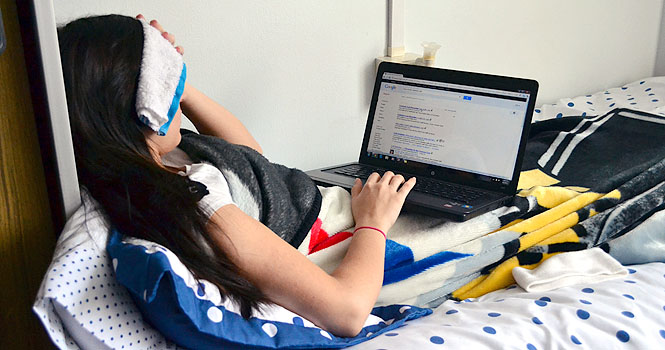Online diagnosing leads to excessive worrying
Self-diagnosing from medical websites can be inaccurate, dangerous and can lead to excessive worrying. Photo by Emily Martin.
March 12, 2012
Jen Kosek, junior applied conflict management major, said the last time she felt ill she searched on the Internet to try to figure out what was wrong before going to the doctor.
“It started out as just a cough and I went on the Internet and thought it might have been pneumonia, but after I went to the doctor I found out that it was bronchitis,” she said.
Kosek said she frequently does this to search for health information.
Just like Kosek, there are many students who use the Internet to search for personal health information.
“I don’t have insurance so I usually try to treat whatever is going on with me before I see a doctor,” she said. “I don’t frequent the doctor’s office. Only if I really have to, then I’ll go.”
Angela DeJulius, chief physician at the DeWeese Health Center, said searching online to diagnose yourself could be inaccurate and dangerous.
She said eight in every 10 Americans who use the Internet look for health information online, but she doesn’t recommend this method.
“One of the things that we do when we see a patient is actually examine them. For instance, we check their blood pressure, temperature, pulse and other elements,” she said. “You wouldn’t get that at all if you try to diagnose yourself from the Internet.”
DeJulius said searching on the Internet to diagnose small ailments could lead to excessive worrying.
“There is a tendency to over-diagnose yourself when you are searching on the Internet,” she said. “For instance, if you have vague symptoms of fatigue or aches, it can be attributed to any number of things.”
DeJulius said the excessive worrying that comes with Internet diagnosis is referred to as cyberchondria.
“A lot of times you can be worrying more than you really need to,” she said. “If you look on the Internet you can find all kinds of frightening things, but physicians are able to give more perspective about the matter.”
DeJulius said one benefit of using the Internet for health information is to learn more about your diagnosis rather than diagnose yourself.
“I think if you get diagnosed by the doctor, the Internet can be helpful in learning more about it because sometimes a doctor’s visit can get a bit busy and a lot of information can be thrown at you, which doesn’t necessarily all sink in,” she said. “We’ll often hand you a piece of paper with information, but a lot of times we’ll actually refer you to a good website for more information about the matter.”
Sophomore nursing major Alexa Board said she doesn’t have an interest in looking online for health information.
“I think that looking on the Internet can be a good idea, but there are a lot of different diseases that have similar symptoms and you can easily misdiagnose yourself,” she said. “You can’t believe everything on the Internet because it’s just so much information.”
Contact Samara Sands at [email protected].

























